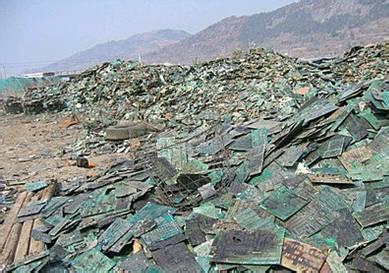The town of Agbogbloshie in the West African country of Ghana has been called a digital dumping ground. Millions of tons of discarded electronics wind up there annually, so people can try to recover anything of value. It's therefore one of the most polluted places in the world, because workers burn plastic coatings to get at the metal in the guts of gadgets.
西非加納的阿博布羅西(Agbogbloshie)被稱為“數字填埋場”,每年,傾倒在這的廢棄電子垃圾達數百萬噸。因此,人們能在這找回任何有價值的東西。這里是世界上污染最嚴重的地方,因為工人們會通過焚燒塑料外殼,從各種配件的內部獲取特定金屬。
But Agbogbloshie is about to get cleaner, thanks to the opening of a new facility for handling such e-waste. Four machines that can strip plastic will prevent the burning that produces hazardous smoke.
多虧了一種用于處理電子垃圾的新型設備,阿博布羅西就要變得更加清潔了。這四臺機器能剝去塑料外殼,防止燃燒產生有害煙霧。

E-waste is a large and growing problem thanks to the large and growing appetite for electronics. Responsible recyclers exist, but too much e-waste still ends up being exported and improperly disposed of in places like Agbogbloshie.
由于電子產品的需求日益增加,電子垃圾成了越來越嚴重的問題。雖然有負責回收的工作人員,但仍有大量的電子垃圾未得到合理處理,被輸送到像阿博布羅西這樣的地方。
The worst e-waste remains batteries. The most common type, lead-acid batteries, are classified as toxic waste once used. And more and more rechargeable lithium ion batteries are finding their way into landfills and other unsafe disposal sites.
最糟糕的電子垃圾還是電池。最常見的類型,如:鉛酸電池,它一經使用,便成了有毒廢物。還有越來越多的鋰離子二次電池將被送往垃圾填埋場和其他不安全的垃圾處理場。
But the problem of e-waste can be solved with proper recycling. The new machines in Agbogbloshie should be able to strip enough wires to produce about 10 metric tons of copper a month. That's good news for livelihoods—and lungs—of local residents.
通過合理回收,電子垃圾問題是能夠被解決的。阿博布羅西的新機器每月大概能從電線中剝出10噸銅來。這對當地空氣、居民及其生計來說,都是個好消息。











